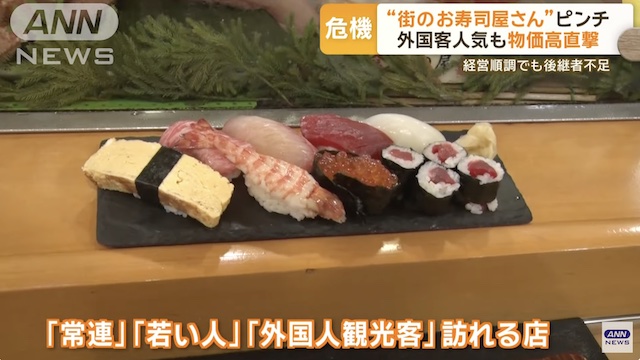TOKYO, May 17 (News On Japan) - Have you ever experienced the sudden disappearance of your local sushi shop? Amid the success of major conveyor belt sushi chains, 'neighborhood sushi shops' are now facing an existential crisis.

Expected Increase in Bankruptcies Since COVID-19
Ichihachi Fukuzushi, located in Sumida Ward, Tokyo, was established in 1965. This longstanding sushi restaurant has been in business for over half a century. Currently, the second-generation owner, Kazuya Kurumizawa, 54, has taken over the business from his father. Kurumizawa: 'Because it's a small shop, we need to be agile. When customers support us, we need to respond in kind. Even in a neighborhood like this, the number of lodging facilities has increased. As a result, foreign visitors find us through searches and come to our shop.' The restaurant, which attracts not only regular customers but also young people and foreign tourists, is now in crisis. While major conveyor belt sushi chains such as Kura Sushi have opened stores in Ginza targeting inbound tourists, sushi is currently very popular among foreign visitors. Despite the expected demand from inbound tourism, five small, independently run sushi shops went bankrupt in January alone. Unlike the thriving major chains, it is forecasted that the annual number of bankruptcies will exceed 30, a level not seen since the COVID-19 pandemic. The main factors squeezing these businesses are rising costs for ingredients and utilities.Lack of Successors Despite Business Success
In some cases, despite stable business, shop owners are considering closing. Kurumizawa's shop is one such example. Kurumizawa: 'My son, who is 26 this year, works as a company employee and will not take over the business. It’s tough. I really wish he would continue.' With his son working as a company employee, there is no successor to the business. Kurumizawa: 'He told me, “It’s not for me, I have things I want to do.” I thought, it can’t be helped. You can’t force someone to do this kind of work. I don’t think the artisan world can be sustained with reluctance.' What does the future hold for the shop? Kurumizawa: 'If it comes to that, I'll close the shop neatly and build a house where I can live with my child, and that will be the end of it. I have confidence that I can keep going until I’m 70, so for now, I’ll do my best until then.'Source: ANN














